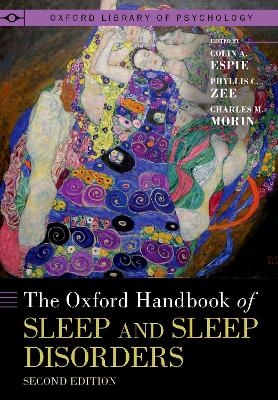
The Oxford Handbook of Sleep and Sleep Disorders
Oxford University Press Inc (Verlag)
978-0-19-760275-1 (ISBN)
- Noch nicht erschienen (ca. Oktober 2025)
- Versandkostenfrei innerhalb Deutschlands
- Auch auf Rechnung
- Verfügbarkeit in der Filiale vor Ort prüfen
- Artikel merken
The Oxford Handbook of Sleep and Sleep Disorders has been carefully collated by its internationally renowned editors to provide a comprehensive and up-to-date guide to our understanding of sleep and circadian processes, and of the clinical disorders of sleep and sleep-wake regulation. The handbook therefore covers what sleep is and why it matters, but also explains the disorders of sleep, and how they can be assessed, differentiated, and treated.
Comprising 46 chapters, each written by leading experts in their field, the handbook is organized around four sections: 1. the fundamentals of sleep and circadian processes; 2. the roles and functions of sleep; 3. societal factors influencing sleep; and 4. disorders of sleep and circadian function. This final section is further subdivided into several components including epidemiology, classification, and assessment; management and treatment; and lifespan issues and special populations.
Taken together the handbook offers clinicians and scientists the most contemporary and authoritative single resource for clinical practice and for research in the developing fields of sleep science and sleep medicine.
Colin A. Espie is Professor of Sleep Medicine in the Sleep & Circadian Neuroscience Institute, University of Oxford. He is Founding Director of Experimental and Clinical Sleep Medicine research, and Clinical Director of the Oxford Online Programme in Sleep Medicine. He is also Emeritus Professor of Clinical Psychology, University of Glasgow. He is internationally known for his work on insomnia and its treatment, using cognitive behavioral therapeutics (CBTx), with a focus on making effective therapy available at scale. He has published more than 300 scientific papers and several textbooks and has many professional commitments to national and international sleep societies and journals. He co-founded Big Health, developer of Sleepio™, a CBTx program for insomnia, now widely available in NHS-UK and in US healthcare systems. Phyllis C. Zee is the Benjamin and Virginia T. Boshes Professor in Neurology and Professor of Neurobiology at Northwestern University, as well as Director of the Center for Circadian & Sleep Medicine (CCSM) and Chief of the Division of Sleep Medicine at Northwestern University's Feinberg School of Medicine. She oversees an interdisciplinary program in translational sleep and circadian rhythm research and a central theme of her research program is understanding the role of circadian-sleep interactions on the expression and development of cardiometabolic and neurologic disorders. She has published more than 300 scientific papers and findings from her team have paved the way for innovative approaches to improve sleep and circadian health. Charles M. Morin is Professor of Psychology and Director of the Sleep Research Centre at Université Laval in Quebec City. He holds a Canada Research Chair on behavioral sleep medicine. Professor Morin is a world leader on insomnia research. He has been at the forefront of new developments on behavioral approaches to treating insomnia and studying the natural history of insomnia with its risk factors and long-term consequences. He has held several leadership positions in the field of sleep medicine, including as President of the World Sleep Society and the Canadian Sleep Society. He is currently an Associate Editor for the journals SLEEP and for Behavioral Sleep Medicine. Professor Morin has published 10 books and more than 300 articles, and these writings have been instrumental in enhancing the standards of clinical care for patients affected with sleep disorders.
Introduction
Section 1: The Fundamentals of Sleep and Circadian Processes
Chapter 1: Sleep and the Brain
Lilia Roshchupkina, Charline Urbain, and Philippe Peigneux
Chapter 2: The Regulation of Human Sleep and Wakefulness: Sleep Homeostasis and Circadian Rhythmicity
Derk-Jan Dijk and Alpar S. Lazar
Chapter 3: Sleep and Circadian Development in the Early and Developing Years
Innessa Donskoy and Temitayo Oyegbile-Chidi
Chapter 4: Sleep and Circadian Development in Adults and Older Adults
Jeanne F. Duffy, Arturo Arrona-Palacios, and Pamela Song
Chapter 5: The Genetics of Sleep
James B. Jaggard, Keri J. Ngo, and Philippe Mourrain
Chapter 6: Local Sleep
Vladyslav V. Vyazovskiy and Thomas Andrillon
Section 2: The Roles and Functions of Sleep
Chapter 7: Why We Sleep
H. Craig Heller
Chapter 8: Brain Clearance, Sleep, and Circadian Rhythms: Implications for Brain Health
Eva M. van Heese, Erik N.T.P. Bakker, and Ysbrand D. van der Werf
Chapter 9: Sleep and Circadian Rhythms and Metabolism
Anne-Marie Chang, Praneet C. Kaki, Robin K. Yuan, Christopher M. Depner, and Orfeu M. Buxton
Chapter 10: Sleep, Neurocognitive Function, Learning, and Memory
Daniel Baena, Alyssa Pozzobon, Joel Hordijk, Laura B. Ray, and Stuart M. Fogel
Chapter 11: Sleep and Human Performance
Courtney A. Kurinec, Jonah A. Scott, and Hans P. A. Van Dongen
Chapter 12: Sleep and Emotion Regulation
Debora Meneo, Monica Martoni, and Chiara Baglioni
Chapter 13: Sleep, Dreams, and Dreaming
Joseph De Koninck
Section 3: Societal Factors Influencing Sleep
Chapter 14: Multidimensional Sleep Health: An Emerging Framework for Understanding Sleep in Relation to Multiple Health Outcomes
Caitlan A. Tighe, Meredith L. Wallace, Rachel P. K. Conlon, Marquis S. Hawkins, Christopher C. Imes, and Daniel J. Buysse
Chapter 15: Sleep, Social Inequalities, and Societal Costs
Mari Hysing, Tormod Bøe, and Børge Sivertsen
Chapter 16: Sleep, Health, and Shift Work
Siri Waage and Bjørn Bjorvatn
Chapter 17: Sex Differences in Sleep
Fiona C. Baker, Rena Wang, and Helen S. Driver
Chapter 18: The Impact of Prescription and Recreational Drugs on Sleep
Kai Spiegelhalder, Christoph Nissen, and Dieter Riemann
Chapter 19: Bedtime Social Media Use and Sleep: A New Understanding of Social, Emotional, and Cognitive Processes
Holly Scott and Heather Cleland Woods
Section 4: Disorders of Sleep and Circadian Function: Epidemiology, Classification, and Assessment
Chapter 20: The Epidemiology of Sleep and Circadian Disorders
Katie Stone and Qian Xiao
Chapter 21: Sleep Disorders: Classification and Diagnosis
Jack D. Edinger, Ana I. Fins, and Charles M. Morin
Chapter 22: Value-Based Clinical Sleep Medicine: Health Economic Considerations Regarding Insomnia and Obstructive Sleep Apnea
Emerson M. Wickwire
Chapter 23: Clinical Assessment of Sleep-Wake Complaints
Jason C. Ong, Colin A. Espie, and James K. Wyatt
Chapter 24: Actigraphy and Behavioral Assessments of Sleep and Circadian Disorders
Monica R. Kelly, Nathaniel Yuan, Alexander J. Erickson, and Jennifer L. Martin
Chapter 25: Polysomnography and Emerging Technologies to Evaluate Sleep Disorders
Thomas Penzel, Ingo Fietze, Martin Glos, Matthew Salanitro, and Lisa Rosenblum
Section 5: Disorders of Sleep and Circadian Function: Management and Treatment
Chapter 26: Insomnia I: Conceptualization and Etiology
Hannah Scott, Philip Gehrman, and Michael Perlis
Chapter 27: Insomnia II: Behavioral and Physiological Assessment
Célyne H. Bastien, Jason G. Ellis, Florence Lambert-Beaudet, Alexandre Rudziavick-Provençal, and Elham Garmroudinezhad-Rostami
Chapter 28: Cognitive Behavioral Therapies for Insomnia: Current Status and Challenges Ahead
Charles M. Morin and Simon D. Kyle
Chapter 29: Parasomnias I: Nightmares
Serena Scarpelli, Valentina Alfonsi, and Luigi De Gennaro
Chapter 30: Parasomnias II: REM Sleep Behavior Disorder
Alex Iranzo
Chapter 31: Parasomnias III: Sleep Terrors and Somnambulism
Antonio Zadra and Francesca Siclari
Chapter 32: Circadian Rhythm Sleep-Wake Disorders I: Phase-Advanced and Phase-Delayed Syndromes
Leon Lack, Gorica Micic, and Nicole Lovato
Chapter 33: Shift Work, Irregular, and Non-24-Hour Sleep-Wake Rhythm Disorders
Diane B. Boivin and Philippe Boudreau
Chapter 34: Sleep-Related Breathing Disorders I: Physiology and Etiology
Danny J. Eckert
Chapter 35: Sleep-Related Breathing Disorders II: Clinical Management
Amy M. Sawyer, Alexa J. Watach, Bruno Saconi, and Lindsey Clark
Chapter 36: Narcolepsies and Other Central Hypersomnolence Disorders
Yves Dauvilliers and Lucie Barateau
Chapter 37: Restless Legs Syndrome and Periodic Limb Movement Disorder
Raquel Martín, Celia García-Malo, Elisa Gamo, Alejandro Herrero, Sofía Romero, Alba García, and Diego García-Borreguero
Section 6: Disorders of Sleep and Circadian Function: Lifespan Issues and Special Populations
Chapter 38: Sleep-Related Problems in Childhood and Adolescence
Liat Tikotzky, Michal Kahn, Michael Gradisar, and Oliviero Bruni
Chapter 39: Sleep Disorders in the Elderly
Ali Amidi, Sonia Ancoli-Israel, Jeanne E. Maglione, and Lisa M. Wu
Chapter 40: Sleep and Psychiatric Disorders
Rachel Manber, Jessica R. Dietch, Nicole B. Gumport, and Norah Simpson
Chapter 41: Women's Sleep and Circadian Rhythms From Puberty to Menopausal Transition
Bilgay Izci Balserak and Kathy Aldrich Lee
Chapter 42: Sleep and Medical Disorders
Leanne Fleming, Megan Crawford, Bethany Martin, Mhairi Patience, and Samantha Fisher-Hicks
Chapter 43: Sleep in Patients With Substance Use Disorders
M. Elizabeth Cardoni, Bhanu Prakash Kolla, Mandilyn Graham, Yosef Bronsteyn, and J. Todd Arnedt
Chapter 44: Sleep-Wake Disturbances in Individuals With Traumatic Brain Injury
Marie-Christine Ouellet, Simon Beaulieu-Bonneau, and Charles M. Morin
Chapter 45: Sleep in People With Intellectual Disabilities
Luci D. Wiggs
Chapter 46: Sexsomnia and Sexual Assault: The Role of the Sleep Forensics Investigator in Court
Michel A Cramer Bornemann and Carlos H. Schenck
| Erscheinungsdatum | 22.10.2024 |
|---|---|
| Reihe/Serie | Oxford Library of Psychology |
| Zusatzinfo | 85 b/w illustrations |
| Verlagsort | New York |
| Sprache | englisch |
| Maße | 178 x 254 mm |
| Gewicht | 3 g |
| Themenwelt | Geisteswissenschaften ► Psychologie ► Klinische Psychologie |
| Medizin / Pharmazie ► Medizinische Fachgebiete | |
| ISBN-10 | 0-19-760275-4 / 0197602754 |
| ISBN-13 | 978-0-19-760275-1 / 9780197602751 |
| Zustand | Neuware |
| Informationen gemäß Produktsicherheitsverordnung (GPSR) | |
| Haben Sie eine Frage zum Produkt? |
aus dem Bereich


